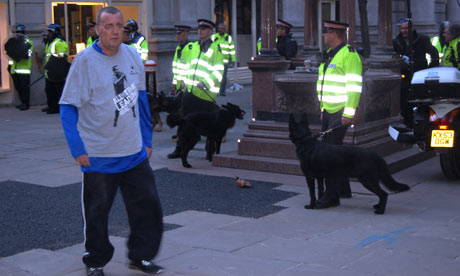Policing the G20 protests
 I did not go to the G20 protests last week, but I spent a lot of time in the late 1980s and through the 1990s at various comparable events, including Reclaim The Streets events, other road protests, squat parties, free festivals, an attempted levitation of Parliament, carnivals against capitalism, guerrilla gardening actions, Mayday events and anti-fascist mobilisations, as well as a few more trad protests. My overwhelming sense of the police was of a tooled up army, relishing confrontation, snearing, provocative, pleased at having the opportunity to actually hurt people.
I did not go to the G20 protests last week, but I spent a lot of time in the late 1980s and through the 1990s at various comparable events, including Reclaim The Streets events, other road protests, squat parties, free festivals, an attempted levitation of Parliament, carnivals against capitalism, guerrilla gardening actions, Mayday events and anti-fascist mobilisations, as well as a few more trad protests. My overwhelming sense of the police was of a tooled up army, relishing confrontation, snearing, provocative, pleased at having the opportunity to actually hurt people.During this period, there were a number of high profile incidents that discredited British policing: the revelations of a series of shocking miscarriages of justice that led to men who were utterly innocent of any crime other than Irishness languishing behind bars for years (I saw Paddy Hill speak a few times, which affected me greatly), the total failure of the Met to investigate the racist murder of Stephen Lawrence, literally dozens of unexplained deaths in police custody, the shooting of Harry Stanley.
I had no doubt, during that time, that I was not on the same side as the police. If I saw police officers stopping someone on the street, my presumption was that he was in the right and they were in the wrong.
Around the turn of the century, a number of good and bad reasons led me to being less active in demonstrations - time, energy, kids, political doubts. I came to see demonstrations like those against the G20 summit in a more jaundiced light - as gestural acts that do more for the psyches of activists than they do to make the world a better place.
In the noughties, I was also affected by a number of crime incidents: a series of horrible incidents my sister experienced on the council estate in Southwark where she lived, the repeated burgalry of a close friend of mine. At a certain point, if I saw police officers on the street, they were no longer the enemy and, at times, they even made me feel reassured.
I don't think I exactly turned to the right because of this stuff. (Who was it said "A conservative is a liberal who has been mugged"?). The people who most experience street crime and burglary are the most vulnerable in our society, and my rage against social injustice increased rather than decreased as I became more aware of this sort of crime. (In fact, some of the most radical groups of the 1980s and 1990s - Class War, Red Action, the Independent Working Class Association - were distinguished from the insipid left precisely in taking seriously the anti-social crime which liberals ignore or seek to explain away.) But this sort of thing led to something of a reappraisal of some of my most deeply held attitudes, and part of that reappraisal was not having any motivation to be in the City of London on April 1 2009.
Last week, though, hearing a very senior police officer anticipate the violence at the 1 April actions with the phrase "We're up for it" brought it all back. I once had a long conversation in a pub with a very smart police officer who had policed many of the demonstrations I had been on in the 1990s. He described the sense of becoming part of something bigger than yourself, of becoming part of a military machine. Of course, I think something of this dissolving of the self happens with protesters too. I guess this is a small, pale reflection of how soldiers feel in war-time. You can see it, though, in the bodily disposition and on the faces of the police officers in the now notorious video of Ian Tomlinson's last moments.
Ian Tomlinson, walking home from work, showing by keeping his hands in his pockets that he is not causing trouble, walking in the direction the police want him to walk, struck by at least one officer, for no reason. His head hits the pavement, and he dies minutes later. The police then lie about his death. Disgraceful, but not, alas, shocking.
Blogging/commentary: Anglo-Buddhist Combine, Alex Massie, Tom Freeman, Newer Labour, Martin in the Margins, Anti-German, Ian Tomlinson's family, Anna Racoon, Sam Leith.
HarpyMarx draws a comparison with the brutal policing of the Tamil demonstators in London yesterday, an outrage which (rather like the Sri Lankan government's massive assualt on Tamil citizens) seems not to interest so many people.
ADDED LINKS: Rachel from North London, Stumbling 1 & 2, Shuggy, Mod.
AND MORE: SlackBastard. Transpontine with the Brockley connection, History is Made at Night.


Comments
Financial Fools Day, on the other hand, displayed creativity. There may have been no policy focus to the protest, but with such a disparate coalition of groups involved, there could never have been agreement on solutions to the financial crisis.
As an expression of dissatisfaction with the state and our supposedly "capitalist" economic system, G20 Meltdown and Climate Camp in the City were second to none. Like Comrade Bob I've become somewhat jaundiced with the advancing years, but I like to think that I can still sense when something positive is happening, and support it. For once I am not depressed.
I notice the bobbies have rearmed since guns were heavily restricted, and citizens robbed of competent tools and the right to use them for their own protection/defense.
What a shame.
http://www.spunk.org/texts/weird/sp001265.txt
http://www.spunk.org/texts/events/an_uk/sp000617.txt